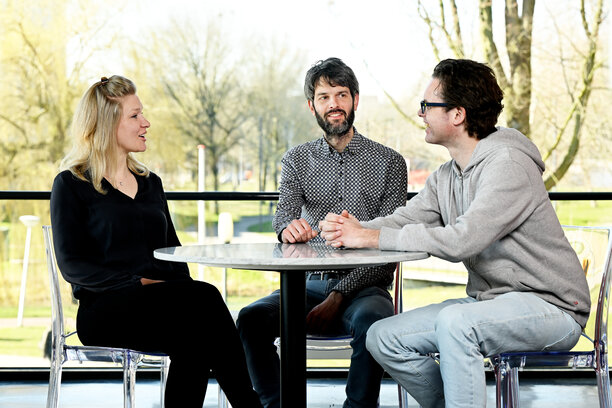‘The default is no longer solely research’
Thanks to Recognition and Rewards, you can now follow an academic career under three profiles: Research, Education, and Impact.

Our university has three tasks: teaching, research, and impact - what can society do with our education and research? From now on, TU/e academics can follow a career in any of these three areas, thanks to Recognition and Rewards. A pilot project in these three profiles - Research, Education, and Impact - will commence at the end of this year. But Rector Frank Baaijens invites academics who already know where their hearts lie to share that ambition.
Teaching is not always considered a way to boost your academic career. For example, in the 2019 Teaching Cultures Survey, when responding to the question “Does teaching advance or hinder promotions within our university?”, more than half of TU/e participants said it hinders their career.
April sees the start of our university’s second round of questions among the academic staff in the long-standing Ruth Graham study. With the new Recognition and Rewards system in mind, Rector Baaijens and Professor Jan van der Veen of the Eindhoven School of Education are curious to see whether that question will be answered differently this time. “The debate has begun,” says van der Veen.
Specter
Due to Recognition and Rewards, becoming a full professor or being promoted no longer hinges solely on how good you are at research. The basis remains a combination of teaching and education. However, you can climb the academic ladder even if you follow the Education or Impact profiles. With the correct requirements, of course. “I’ve noticed that there’s a false belief that if you score a 7 for your educational evaluation, a career in teaching is a given,” says Van der Veen.
Baaijens adds: “We will consider the so-called demonstrable products that clearly show you have achieved something extraordinary. That you provide excellent, innovative, impactful education and others follow your example. That your lessons enjoy international recognition, as evidenced by, for example, winning a teaching prize, securing external funding for an educational innovation, giving a lecture at international conferences, and having had something published about your lessons.”
Van der Veen: “At your annual appraisal, you can also discuss, say, setting up a new master quantum technology that will attract x number of students. Of putting serious effort into revising that Bachelor’s Degree that’s currently underway."
Your sole focus shouldn’t be on your career path. It’s important to enjoy your job; it should energize you.
Rector magnificus Frank Baaijens

“Most importantly,” says Baaijens, “you shouldn’t focus solely on your career path. Above all, you should enjoy your job; it should energize you. If people have an enormous passion for teaching, let them develop along that path, and give them an appreciation for it. Recognition and Rewards allows you to follow your passion and meld your personal ambition with the university’s important tasks.”
Trust
For Baaijens, the biggest challenge in implementing Recognition and Rewards is getting people to trust it. “They have to feel we mean business and that we’re going to act accordingly. That it leads to a true change in the way we consider careers.”
“This new system being rolled out in all Dutch universities and research institutions should bolster that trust,” says Van der Veen. “People will first want to see before they believe,” thinks Baaijens. “It takes consistency and commitment to implement it properly.”
The BACs, TU/e’s assessment advisory committees, deal with hiring new staff and promotions and play a key role in Recognition and Rewards’ success. “If people come out of a BAC assessment feeling ‘it was only about my published work,’ we’re sending the wrong message,” Baaijens says. “It will take a while to have the right conversations and make the right judgment calls; not surprising when you’ve been on a certain path for 65 years. The important thing is that we’re working on getting into the correct mode.”

Doctoral students working toward their UTQ still hear ‘rather focus on your research’. That has to change.
Professor Jan van der Veen
Baaijens sees a vital role for the roughly 60 members of the TU/e’s three Interfaculty Committees’ (IFC). “They’re closely involved in the Recognition and Rewards process and attend BAC meetings, of which there are about 160 a year. After all, it requires a cultural change, a different way of entering into discussions.”
“During a BAC, it was often the case that your volume of published work was considered. And whether there were any complaints about your teaching. Now we ask, ‘Have you been involved with teaching innovations? What impact does that have?’ We’re looking much more for equality between teaching, research, and impact. If you grow in the area of research, your international reputation increases, and so does your impact. That has to happen for education as well,” says Baaijens. “We want to get institutional leaders for education, just like we have in research.”
Other things, too, have to undergo a cultural shift. Van der Veen gives an example: “Professors sometimes tell their doctoral students who are working toward their University Teaching Qualification (UTQ) to focus on their research and forget about the UTQ. Meanwhile, that’s how you start your career. That’s where we, as a university, must change the narrative.”

Educational champions
Allowing academics the choice to shine in something other than just research requires a shift in how departments and faculties think and work. “Research is no longer solely the default,” says Baaijens. Van der Veen adds, “There needs to be a sense that it’s strategically important to have top people in the field of education as well.”
“A group leader must begin to think differently about task distribution and fields of interest within their group. Is the big picture aligned? Within a group of ten people, it’s, of course, impossible for eight to focus on education. Moreover, the big picture must fit the department in question’s goals and plans,” says Baaijens.
Making agreements
Managing expectations is critical to successfully implementing the three profiles. “You have to agree, well in advance, what people have to deliver,” Baaijens says. That’s where the narrative CV comes in. “In it, academics make it clear why they want to choose a particular profile. They share who they want to be and how they think they’ll develop if they specialize in one of the profiles. That’s where everything starts.”
“When academics are up for promotion, they are also asked, at a BAC, to reflect on what they’ve achieved with their research and teaching, also regarding its impact. And they have to reflect on their leadership profile. How do I supervise my doctoral students? What are my skills when it comes to collaboration? We want them to tell us what they’re proud of; from obtaining grants to getting an article or data published, selling patents to a company, or speaking about their new lesson idea at an international conference.”
The three profiles
Once you become a UD1 (assistant professor) and are on your way to becoming an associate professor, you can choose one of three profiles - research, education, or impact - from the next academic year. You share your profile choice in a personal development plan. Baaijens: “Obviously, this will have to be coordinated with the department. We find team science increasingly important, and you need people with different qualities in every team, but you must keep it balanced.”
Baaijens points out that not everyone has to excel in all three domains. “That’s exactly not the intention. It’s about placing accents. You always need a basic level in research, education, and impact, but you must emphasize one of those areas.”
How many academics will opt for, say, the educational profile? “That’s very hard to estimate,” says Baaijens, “but if one in ten academics were to focus on excelling in the educational profile, that would already be a considerable step. We need to banish the current uncomfortable notion that teaching is considered ‘less’ than research.” Van der Veen adds: “When you go from a handful to larger numbers, it will become increasingly normal for people to choose an education profile.”
Uncertainties
The criteria for the three profiles were discussed at the Eindhoven Young Academy of Engineering, which included young researchers. “They were a little uncertain about choosing a particular profile. Suppose I choose a profile other than research, and the university stops doing this after a few years; what then? And what if I move to a university abroad? How will they view my choice?”
“We’re not trying to trip anyone up,” says Baaijens. “It could well be that you make great strides in research for several years while not being as active in teaching. That doesn’t mean you can’t still opt for an educational profile at a later stage. Or vice versa. It’s up to us, as a university, to help people with that.”
Van der Veen says other international universities also use narrative CVs and have other profiles than just research. “Cornell University and UCL Londen already do, and we’re seeing how they did it. In June, we’ll meet with other international technical universities to discuss where everyone stands in this process.”
The Teaching Cultures Survey
In 2019, 2022, and 2024, TU/e is participating in the Ruth Graham Teaching Cultures Survey. This long-running survey aims to provide an image of the teaching culture and status at international universities. In 2019, 21 universities and institutes from ten countries took part. This year, some 20-25 universities are participating. From April 12 to 26, academic staff who teach at TU/e will be invited, via email, to fill out the survey - it takes about five minutes. The survey report is expected in October.

In the second half of this year, three departments will run a pilot project with the three profiles and the narrative CV. Baaijens: “We want to see how it works, whether we’ve forgotten anything, and if the BAC members can handle it. Does it lead to the right discussions and the correct determination?”
And, in 2023, these profiles and the narrative CV will be rolled out university-wide. Baaijens does not expect that many profiles other than research will be chosen right away but calls on academics who already want to make that choice to speak up.
Baaijens and Van der Veen are curious about whether sentiments concerning valuing teaching will have already changed in this year’s survey. “I think it’s too soon. I do expect to see a real difference in 2024,” says Baaijens. “By then, the profiles will have been well implemented, and we’ll have shown that Recognition and Rewards is more than an idea on a piece of paper; that people have a true opportunity to follow their passion.”
More stories on Recognition and Rewards
More on our strategy


![[Translate to English:] [Translate to English:]](https://assets.w3.tue.nl/w/fileadmin/_processed_/c/f/csm_BvOF_2024_0319_AEV_license_TUe_Dirk_van_Meer_-_CORE_1__c976e259a5.jpg)
